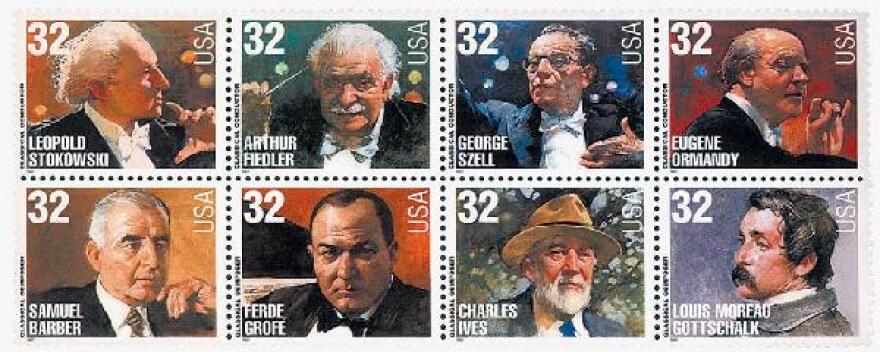Composer and conductor Ferde Grofé was a household name when he visited Interlochen in the 1940s.
He was a pianist in the Paul Whiteman Orchestra and served as Whiteman's chief music arranger for over a decade.
Most famously, Grofé orchestrated George Gershwin's "Rhapsody in Blue" for Paul Whiteman's Orchestra.

Gershwin had written the piece for two pianos, and it was Grofé's orchestration that gave "Rhapsody in Blue" its iconic sounds, such as the clarinet trill at the piece's beginning.
In addition to his work with the Paul Whiteman Orchestra, Grofé was an orchestra leader on several popular radio shows, including The Fred Allen Show and Philip Morris Playhouse and Philip Morris Radio Show.
Grofé not only led orchestras and arranged music, but he was also a composer in his own right.

His most famous composition is "On the Trail," a movement from the Grand Canyon Suite, written in 1931.
The popularity of this piece cannot be overstated.
None other than Arturo Toscanini and the NBC Symphony recorded "On the Trail" for RCA Victor, and it was used as the theme music for Philip Morris radio and television commercials for decades.
Grofé visited Interlochen's National Music Camp in the summers of 1942 and 1943.
While at Interlochen, he conducted young musicians in the orchestra and band in a variety of repertoire - but he always included his own music on their programs, too.

Some of the concerts that Grofé conducted at Interlochen were broadcast on WKAR and preserved on 16-inch transcription disks.
Composer and pianist Percy Grainger was on the National Music Camp's faculty the same summers as Grofé, and their paths crossed in interesting ways.
For example, on July 17, 1943, the High School Orchestra performed Grofé's orchestration of "Rhapsody in Blue," and Percy Grainger was the piano soloist.

Grofé spent the later part of his career teaching orchestration at the Juilliard School of Music.
He also composed music for films.
His score to 1950's "Rocketship-XM" was the first science fiction film music to use the Theremin. (it was also skewered in a 1990 episode of "Mystery Science Theater 3000.")
Grofé continued to compose until his death in 1972 at the age of 80.

His music remains some of the most famous and recognizable composed in the last century.
"Rhapsody in Blue" is is performed hundreds of times a year by major orchestras all over the world, nearly all of whom use Grofé's orchestration.
"On the Trail" can be heard everywhere from the Disneyland Railroad to the 1983 film "A Christmas Story."
Grofé was honored with a United States postage stamp in 1997.
His stamp was included in a collection of American composers and conductors along with Samuel Barber, Arthur Fiedler and Leopold Stokowski.

Transcription disks of National Music Camp radio broadcast were recently digitized for preservation thanks to the generous support of the Hamer D. and Phyllis C. Shafer Foundation. Stefan Wiebe remastered the digitized archival recordings.
Eileen Ganter provided additional research support for this article.


